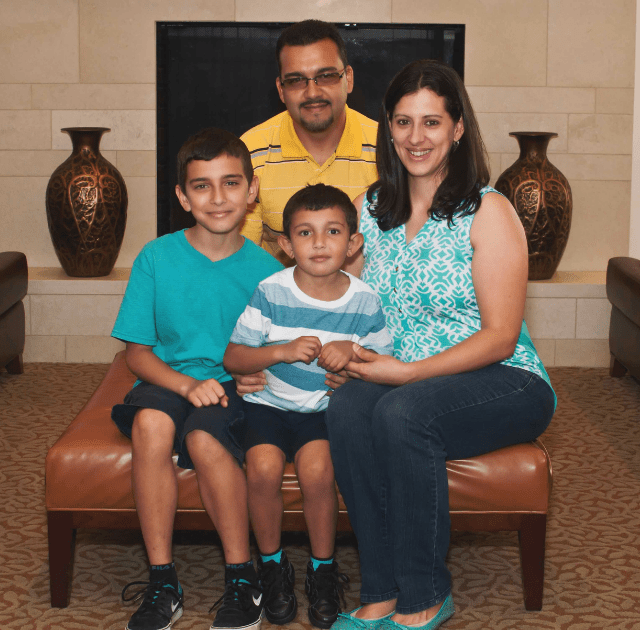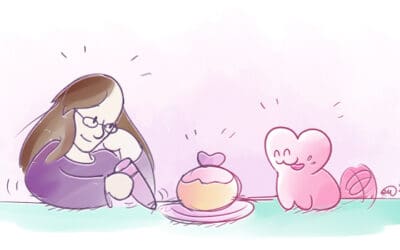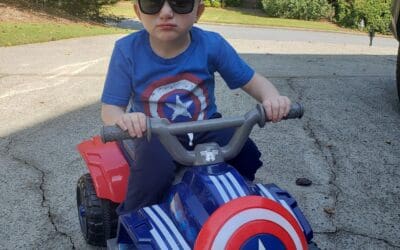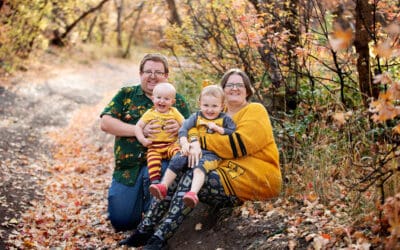¡Conoce a Kenny!
Meet Kenny!
English version below
Kenneth, nuestro hijo, nació el 5 de agosto de 2011 con una bilirrubina muy alta. El Dr. Leonardo Holmaza del Hospital Infantil San Jorge en Puerto Rico sospechaba de atresia biliar, pero dijo que podría tener uno de más de 80 problemas hepáticos asociados con la bilirrubina alta. Para investigar, Kenny se sometió a una biopsia de hígado, una exploración HIDA, pruebas genéticas, una prueba de alfa 1 antitripsina, sangre y otras pruebas. Antes de que se encontrara un diagnóstico oficial, y debido a que el médico sintió que Kenny tenía BA, la cirugía de Kasai se realizó a los 2 meses de edad. El embriotoxón posterior se descubrió a los 4 meses de edad, y finalmente en mayo de 2012 supimos que Kenny era positivo para Jagged 1. Después de saber esto, en diciembre de 2012, viajamos a Filadelfia para ser evaluados por el Dr. Piccoli y regresamos a nuestro país para continuar el tratamiento. recomendó. Las medicinas en Puerto Rico no habían avanzado tanto como en otros países y sabiendo que nuestro hijo podría algún día necesitar un trasplante de hígado, nos preocupamos y nos llenaron de miedo. Sabíamos que lo que necesitaría no estaba en Puerto Rico. Eso nos causó mucha angustia.
El síndrome de Alagille cambió la vida de todas las formas posibles. La agonía que este diagnóstico causó en nuestras vidas fue impactante. Ver a nuestro bebé rascarse día y noche y escuchar sus llantos fue difícil. Nuestras manos estaban atadas. Simplemente no pudimos ayudarlo y fue exasperante. Buscamos respuestas a través de la oración, encontramos refugio en Dios y sentimos consuelo en Él. Nuestra familia ayudó de muchas maneras, incluso ayudándonos a recaudar dinero para mudarnos a Filadelfia desde Puerto Rico. Recaudamos dinero de todas las formas posibles. ¡Incluso hicimos una aparición en televisión en Puerto Rico! Nos dieron nuestros billetes de avión. También celebramos un carnaval de baloncesto para recaudar fondos. Antes de que pudiéramos mudarnos, tuvimos que dejar nuestros trabajos y declararnos en quiebra. Dejamos nuestra vida, nuestra familia y todo lo que teníamos para buscar la mejor atención médica para Kenny.
El viaje fue drástico y agotador. Nos sentimos perdidos. No entendíamos qué estaba pasando con nuestro bebé a pesar de que su médico fue excelente y nos guió paso a paso. La información que llegaba era difícil de entender. Necesitábamos mucha ayuda para saber cómo procesarlo y afrontarlo.
Una vez que nos mudamos, la atención fue mucho más accesible. Saber que nuestro hijo era paciente de un grupo de expertos en el síndrome nos dio descanso. Por otro lado, estábamos aquí sin nuestra familia y eso era algo a lo que teníamos que acostumbrarnos. El transporte y la facilidad de vivir en una ciudad eran beneficiosos, pero era muy diferente de todo lo que conocíamos. No saber inglés también fue muy difícil. Creemos que valió la pena porque nuestro hijo recibió y sigue recibiendo el tratamiento adecuado para su síndrome y estamos muy agradecidos.
La carga de la enfermedad es muy pesada. Primero debes afrontar el diagnóstico. Esto te ayudará a superar los miedos o al menos a aprender a vivir con ellos. Debes enfocarte en ser liviano para tu camino y fortaleza para tu vida. Ver a Kenny atravesar las etapas de deterioro de su salud fue doloroso. A medida que crece, le resulta más difícil porque ahora comprende más y nos hace preguntas. Mirando hacia atrás, mi esposo y yo estábamos emocional y físicamente agotados. Comenzó el día en que el médico se lo quitó de las manos y lo puso en la UCIN. Recuerdo esos días y realmente no sé cómo estoy sentado aquí escribiendo esto. Definitivamente hay fortalezas que Dios nos da para superar lo que no podemos.
Le diría a otras familias internacionales de ALGS que sigan luchando, creyendo y no se rindan. Si una puerta se cierra, toca otra. Es difícil pero también es muy importante ser fuerte. Transmita confianza y haga que sus hijos sientan que todo está bien. Trate de no transmitir sus miedos y dudas a sus hijos. No estas solo. ¡Otras familias también están pasando por esto y estamos todos juntos! También es importante que las familias se conecten a ALGSA. Lo hicimos tan pronto como nos enteramos del síndrome de Alagille. En ALGSA encontramos soporte, información, respuestas y otro tipo de ayuda. Tuvimos la gran oportunidad de asistir a uno de los simposios por primera vez en 2014 en Washington DC. Fue genial ver a todos los niños juntos. Recuerdo cuánto bailó Kenny. Estaba tan feliz. De hecho, recuerdo al Dr. Piccoli revisando a nuestro bebé en una mesa allí. ¡Es un amor!
Creo que las familias tienen el deseo en su corazón y esperan encontrar lo mejor para sus hijos. También creo en los problemas socioeconómicos que enfrentan muchas familias. No tuvimos problemas para ingresar a Estados Unidos porque éramos ciudadanos, pero muchas familias de Centroamérica y otros países no tienen muchas opciones. Me encantaría que las familias pudieran traer a sus hijos con Alagille a los EE. UU. Para ser evaluados, pero entiendo que no es posible. Tengo grandes esperanzas de que todo en el futuro sea más accesible para todos.
~ Maribel, mamá de Kenny~~~~~~~~~~~~~~~~~~~~~~~~~~~~~~~~
Kenneth, our son, was born on August 5, 2011, with very high bilirubin. Dr Leonardo Holmaza at San Jorge Children’s Hospital in Puerto Rico suspected biliary atresia but said he could have one of more than 80 liver issues associated to the high bilirubin. To investigate, Kenny had a liver biopsy, a HIDA scan, genetic tests, an Alpha 1 Antitrypsin test, blood and other testing. Before an official diagnosis was found, and because the doctor felt Kenny had BA, the Kasai surgery was done at 2 months old. Posterior Embryotoxon was discovered at 4 months old, and finally in May 2012 we learned Kenny was positive for Jagged 1. After learning this, in December 2012, we traveled to Philadelphia to be evaluated by Dr Piccoli and returned to our country to continue the treatment he recommended. The medicines in Puerto Rico had not advanced as much as in other countries and knowing our son might one day need a liver transplant we worried and were filled with fear. We knew what he would need was not in Puerto Rico. That caused us much anguish.
Alagille Syndrome was life changing in every possible way. The agony this diagnosis caused in our lives was shocking. Seeing our baby scratch himself day and night and hearing his cries was hard. Our hands were tied. We just couldn’t help him and it was exasperating. We sought answers through prayer, found refuge in God, and felt comfort in Him. Our family helped in many ways including helping us collect money for a move to Philadelphia from Puerto Rico. We raised money every way we could. We even did a television appearance in Puerto Rico! They gave us our plane tickets. We also held a basketball carnival to raise funding. Before we could move we had to quit our jobs and file for bankruptcy. We left our life, our family, and everything we had in order to seek the best healthcare for Kenny.
The trip was drastic and exhausting. We felt lost. We did not understand what was happening with our baby even though his doctor was excellent and guided us step by step. The information coming in was hard to understand. We needed a lot of help to know how to process it and deal with it.
Once we moved, care was much more accessible. Knowing our son was a patient of a group of experts in the syndrome gave us rest. On the other hand, we were here without our family and that was something we had to get used to. Transportation and the ease of living in a city was beneficial, but it was very different from anything we knew. Not knowing English was also very difficult. We do believe it was a worthwhile move because our son received and is still receiving the appropriate treatment for his syndrome and we’re very grateful.
The burden of disease is very heavy. You must first face the diagnosis. This will help you then overcome fears or at least learn to live with them. You must focus on being light for your path and strength for your life. Watching Kenny go through the stages of declining health was painful. As he gets older, it’s more difficult for him because he now understands more and asks us questions. Looking back, my husband and I were emotionally and physically worn. It started the day the doctor took him out of our hands and put him in the NICU. I remember those days and I really don’t know how I’m sitting here writing this. There are definitely strengths that God gives us to overcome what we cannot.
I would tell other international ALGS families to continue to fight, believe, and do not give up. If one door closes, knock on another. It is difficult but it is also very important to be strong. Convey confidence and make your children feel that everything is fine. Try not to pass your fears and doubts to your children. You are not alone. Other families are going through this too and we are all together! It’s also important for families to connect to the ALGSA. We did as soon as we learned of Alagille syndrome. At ALGSA we find support, information, answers, and other types of help. We had the great opportunity to attend one of the symposia for the first time in 2014 in Washington DC. It was great to see all the children together. I remember how much Kenny danced. He was so happy. In fact, I remember Dr. Piccoli checking on our baby at a table there. He is a sweetheart!
I believe that families have the desire in their heart and hope to find the best for their children. I also believe in the socioeconomic problems that many families face. We had no problems entering the United States because we were citizens, but many families from Central America and other countries do not have many options. I would love for families to be able to bring their children with Alagille to the USA to be evaluated but understand it’s not as possible. I have great hope that everything in the future can be more accessible to everyone.
~ Maribel, Kenny’s Moman!”




